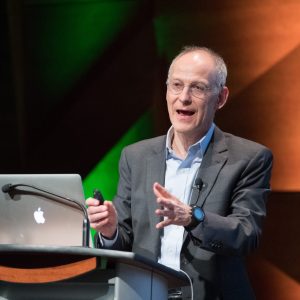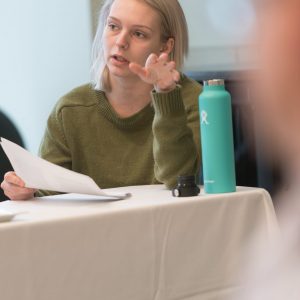“The ultimate aim of the Bodaken Philosophy Symposium is to strengthen CSU’s Department of Philosophy by making it a place where great philosophy happens,” explains Moti Gorin, chair of the Bodaken Symposium committee.
The Bodaken Philosophy Symposium is a multi-year project sponsored by philosophy alumnus Bruce Bodaken to promote philosophical dialogue and to expand the reach of the CSU philosophy department into the community and larger scholarly circles by hosting workshops and lectures by distinguished scholars. Gorin explains its significance, “The Bodaken Symposium series enables the Department of Philosophy to contribute to the generation of important and timely ideas, and, in so doing, to raise the profile of the department as well as the university.”
The Inaugural Year
In the first-year, the Bodaken Philosophy Symposium hosted four events—two large spring lectures and two more academically-oriented philosophy talks in the fall. The inaugural Bodaken public lecture, held on March 26, 2018, featured renowned oncologist, professor, and vice provost at the University of Pennsylvania, Dr. Ezekiel Emanuel, who delivered a thought-provoking lecture entitled “Why I (Still) Wish to Die at 75.” The lecture was held in the CSU Lory Student Center Theatre and was attended by over 500 individuals.

The inaugural lecture was an especially successful event. Dr. Emanuel is well known not only within the academy but more generally through his work with the Obama administration and his public engagement. Also, the topic seemed to garner a lot of community interest. Gorin explains the appeal: “The topic—is it a good thing to invest as individuals and as a society in trying to live longer and longer?—was very provocative, and healthcare themes often get a lot of traction because everybody gets sick, everybody has to pay (too much) for health care, and so on.”
2018-19: Economic Inequality, Well-Being, and Democracy
The first two events featured well-known political philosophers who defend very different conceptions of distributive justice. The first speaker, Dr. David Schmidtz from the University of Arizona, presented “Moral Science 2.0”. Gorin describes Schmidtz as having strong libertarian tendencies and as deeply suspicious of government intervention in the economy. The second speaker was Dr. David Schweickart from Loyola University Chicago who has for many years defended a socialist conception of justice, one that very much runs counter to libertarianism. Schweickart spoke on “Climate, Inequality, Democracy (Unchained)”

The spring 2019 lecture was given by Jonathan Wolff, the Blavatnik Chair in Public Policy and Governing Body Fellow at Wolfson College at the University of Oxford. He is a leading political philosopher who has worked on the nature of disadvantage, inequality, and various topics in applied ethics and public policy. His public lecture, “Can We Fix Institutional Injustices: Racism, Sexism, Poverty?” took place on March 6th in the CSU Lory Student Center Theatre. Wolff spoke about the difficulties in overcoming institutionalized forms of racism, sexism, and poverty.
The three events in this year’s series underscore how philosophers think about and approach social problems like inequality. Gorin points out another benefit of this array of thinkers and discussion: “I think most people came away with a sense for how different positions, when developed carefully, can be plausible in their own right, even when they oppose one another.”
2019-20: Living Together Online: Epistemology, Ethics, and the Internet
This topic focuses on the conceptual puzzles and practical challenges of social life in the information age. The department will host a workshop for students and faculty in mid-October and a distinguished speaker in the spring. The workshop’s featured speakers include: Regina Rini (Canada Research Chair in Philosophy of Moral and Social Cognition, York University), C. Thi Nguyen (Associate Professor, Utah Valley University), Karen Frost Arnold (Associate Professor, Hobart and William Smith Colleges), and James Williams (University of Oxford, Co-Founder, Time Well Spent).

Gorin shares his goals for the fall workshop, “We hope to stimulate good discussion over the two days on themes that are very timely. Nearly every day the New York Times has a story on the ethical and epistemological problems that attend online interactions, big data, automation, the consolidation of power by big tech firms, etc. We hope our participants will be able to shed some light on these very thorny issues.” In addition to lively dialogue and philosophical exploration, Gorin hopes that the workshop will strengthen relationships between scholars working in this area. Additionally, he is considering the possibility of publications emerging from the workshop to share the ideas that grow out of our workshop much more widely.